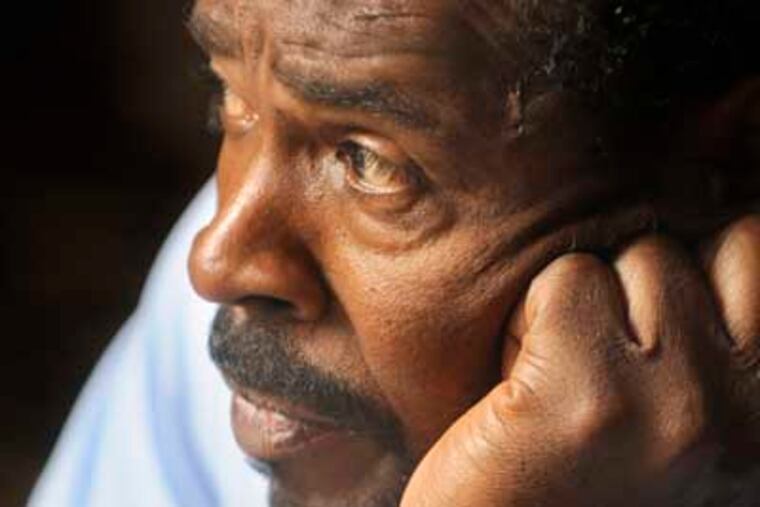Annette John-Hall: Rodney King finds peace
Rodney King makes a dashing first impression when we meet in the lobby of an Old City hotel to discuss his new memoir, The Riot Within: My Journey From Rebellion to Redemption. Tall, strapping, and disarmingly good-looking, King initially projects a confident tranquillity, as though he’s at ease with himself and the people around him. I’m thinking, this guy has got it going on.

This column was originally published on May 4, 2012.
Rodney King makes a dashing first impression when we meet in the lobby of an Old City hotel to discuss his new memoir, The Riot Within: My Journey From Rebellion to Redemption. Tall, strapping, and disarmingly good-looking, King initially projects a confident tranquillity, as though he's at ease with himself and the people around him.
I'm thinking, this guy has got it going on.
But he doesn't. Not really. It's been 20 years since the not-guilty verdict for the four Los Angeles police officers who beat King to within an inch of his life, touching off the most devastating riot in U.S. history. King hasn't fully recovered yet, mentally or physically.
Though his smooth caramel complexion belies the fact that he's a 47-year-old grandfather now, closer inspection reveals unbalanced features: King still has a plate in his cheekbone where the cops broke his jaw, and his right eye, the one repeated baton blows tore from its socket, is slightly misshapen. Headaches and memory loss still plague him.
The beatings instantly made King the poster child for what? Police brutality? Racism? Black male criminals? All of that and more. He was the shattered glass through which folks refracted their agendas. And it blinded him.
"It was nerve-racking to know that all eyes were on me," he says. "No longer was I Glen [the middle name he went by]. I was getting threats on my life from skinheads. All of that played a big role in not knowing how to deal with it."
Which is one of the reasons he wrote The Riot Within. In it, he says the things he always wanted to say and never got to. Not only that, the book tour has allowed King to speak out on topical issues with which he's all too familiar, like the killing of Florida teen Trayvon Martin, another victim of unjust treatment.
"Police have been brutalizing black people for years and getting away with it," he says, "so it's natural for [George Zimmerman, Martin's killer] to think he could think he could take advantage of Trayvon."
His advice for black males stopped by police comes from his nightmarish personal experience: "Be overly humble, cautious. Answer every question and be very, very respectful,"
And, in this era of smartphones, "Hit a recording device before you get pulled over."
That last piece of advice doesn't surprise me. After all, George Holliday's 81-second video turned out to be the eyewitness that saved King.
Personal demons
Truth be told, King was plagued by his personal demons long before the beatings spurred a U.S. Justice Department investigation, forced wholesale changes in the Los Angeles Police Department, and gained him international notoriety. As kids growing up in Altadena, Calif., Rodney and older brother Gailen endured the physical wrath of their alcoholic father whenever the mood hit him. Rodney battled insecurities of never being good enough. He was the special-education kid ashamed to be seen taking the short yellow bus to school, and later became the high school dropout and petty thief who drank too much.
"I turned into the person I always wanted to be after that first quart of beer," he writes. "I was happy, witty, confident, and ready to make the men laugh and the ladies love.? ... I loved to drink from the start."
King was unemployed, on parole, and driving drunk that fateful March 3 night in 1991, when he took officers on a high-speed chase in his Hyundai. The cops pounced, kicking him in the face, breaking his jaw and an ankle, smashing him more than 50 times with their batons, the grooves in their nightsticks leaving horrible cuts on his skin. King writes that the pain felt like "Daddy being at his drunkest extension-cord-swinging worst.... I could hear my bones cracking."
Even with Holliday's smoking-gun video, an all-white jury acquitted the four officers in April 1992 and South Central L.A. went up in flames. King watched aghast as black citizens beat whites and Asians just as the LAPD officers had beaten him. His plaintive plea for peace seared the nation's consciousness.
"Can we all get along?"
A federal trial the next year found the cops guilty, and today, after a subsequent string of DUI charges, King says he is in a much better place. He settled with the city of Los Angeles for $3.8 million, which he used in part to buy his widowed mother a house in Sacramento, Calif., (where she still lives) as well as a home for his family in Rialto, about 60 miles east of Los Angeles. King says he used the rest of the money to pay his lawyers' fees, medical bills, and to start a construction company and a rap record label, both of which are no more. He participates in celebrity boxing matches "to pay the bills," he says.
He still drinks. "But I don't get drunk anymore."
But probably most important, King has managed to forgive. Once I understood that, I realized the peace I saw in him when we met was the total absence of any bitterness or anger.
"I haven't been an angel in my life," he says, "but I've been forgiven many times. If God can forgive me, I can certainly forgive the people who did me wrong."
Contact Annette John-Hall at 215-854-4986, Ajohnhall@phillynews.com, or follow on Twitter @Annettejh.